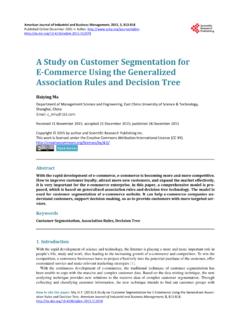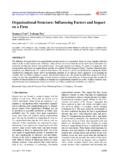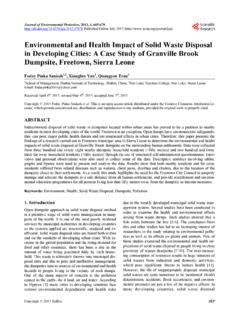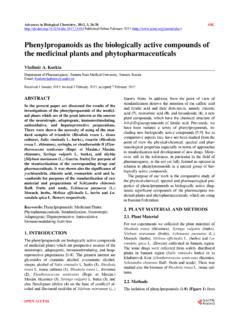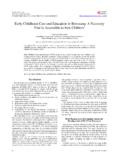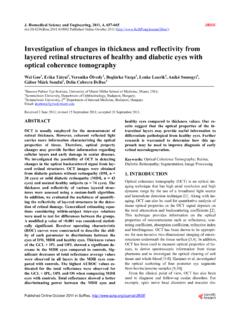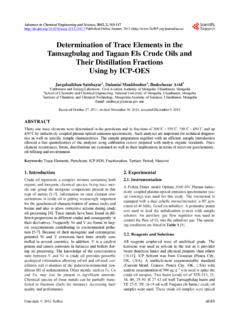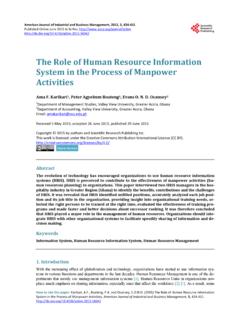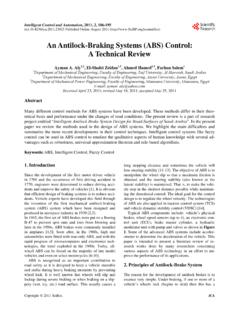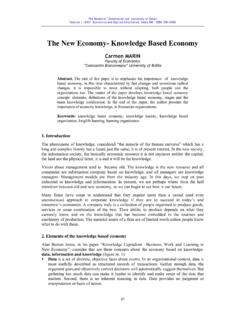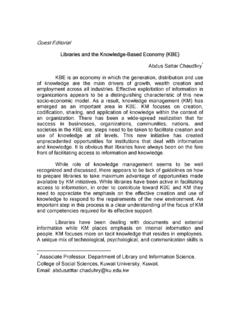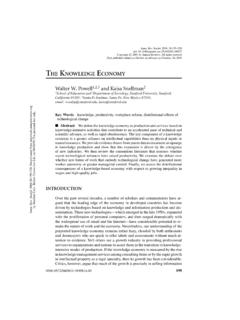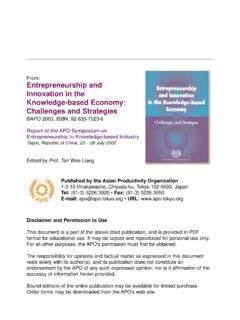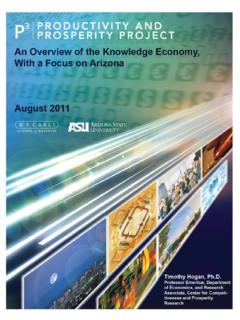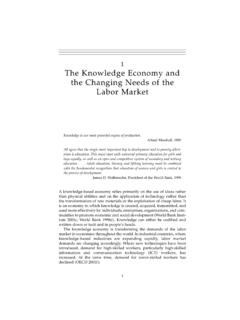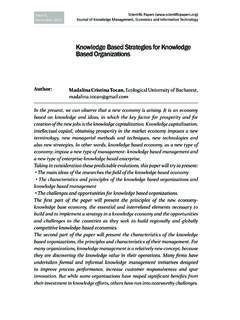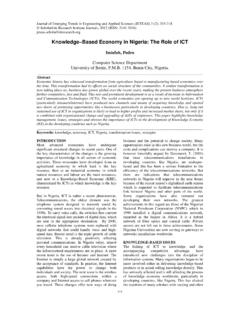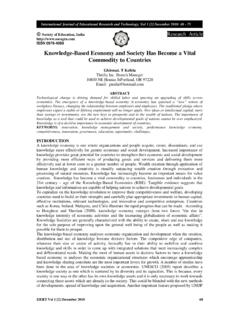Transcription of Knowledge-Based Economy as a Basis for the Long-Term ...
1 Modern Economy , 2015, 6, 888-894. Published Online August 2015 in SciRes. Knowledge-Based Economy as a Basis for the Long-Term Strategy of the Development of the Society Elena Pilipenko Kurgan Division of the Institute of Economics, Ural Branch of the Russian Academy of Sciences, Kurgan, Russia Email: Received 20 July 2015; accepted 14 August 2015; published 17 August 2015. Copyright 2015 by author and Scientific Research Publishing Inc. This work is licensed under the Creative Commons Attribution International License (CC BY). Abstract This article is devoted to the research of theoretical and methodological aspects of Economy of knowledge formation. The emphasis is laid on the evolution of knowledge as the main reason of any changes which take place in the society. Scientific knowledge is considered as the key re- source of creating social wealth; and the process of its production as an indissoluble processing chain which consists of spiritual, informative and material production.
2 Such approach brings about the necessity of drastic review of the whole system of economic categories and grounds in it models, methods, criteria and exponents. Authorial conception of Economy of knowledge is sug- gested. It is based on three main principles: 1) the unity of economic field; 2) preferred develop- ment of spiritual production; 3) accordance of controlling mechanism and effectiveness exponents to the peculiarities of goods of any production. Keywords Society, Economy , System, Knowledge-Based Economy , Mental Production 1. Introduction Today we are intensively searching for a new paradigm of the social development which is able to explain ade- quately the ongoing events and proposes the acceptable concept of the future world order. This process is of principal importance, because every Economy is not an end goal, but a more or less efficient instrument for the implementation of the global goal of any society guaranteeing the continuous process of satisfying the grow- ing needs of the present and the future generations.
3 How to cite this paper: Pilipenko, E. (2015) Knowledge-Based Economy as a Basis for the Long-Term Strategy of the Devel- opment of the Society. Modern Economy , 6, 888-894. E. Pilipenko The degree of efficiency of an economic mechanism will fully depend on the degree of consistency of true (not manifested) goals of the social development with the selected methods of their implementation. In our point of view, today's crisis is related to the fact that the methods of implementation of the stated goal (satisfying the growing needs of the present and the future generations) exclude the very possibility of achieving it. It is the ex- planation for such a tense search of the new economic mechanisms and instruments being relevant to the true goals of the social development. Let us consider which of the existing concepts of the social development will form the best Basis for its implementation.
4 2. Literary Review The concept of the post-industrial society was mostly widespread in the second half of the XX century. In fact, this concept presents the development of the theories of the industrial society (R. Aron) and the stages of the economic growth (W. Rostow) popular in the 60-s of the last century. The main principles of the theory of the post-industrialism are described in the works of D. Bell, H. Kahn, Z. Brzezinsky, A. Toffler, J. Fourasti and others. In general, the concept of the post-industrial society claims to be a general sociological theory of the upward tendency of the mankind. The post-industrial society is set against the pre-industrial and the industrial ones in terms of the following parameters: the main production resource; the type of production activity; the character of basic technologies [1] (Table 1).
5 Still, in spite of the numerous studies, the true reason for the ongoing changes, in our opinion, was not found out, because the principal attention was paid to the description of the external characteristics of each stage of the social development in prejudice of the description of the driving forces, the internal logic and the contradictions of this process. We agree with V. Inozemtsev calling the doctrine of the post-industrialism too objectivist . Paying much attention to the objective factors technique and technology (the so-called technological deter- minism) in prejudice of the subjective factors did not allow the supporters of the post-industrialism seeing the essence of the changes and, thus, finding an efficient mechanism for influencing them. In fact, the consequence was considered to be the cause. All the changes that are described as a reflection of the theory of the post-industrialism the transfer to the information as the main production resource, the substitution of the la- bour-intensive technologies by the research-intensive ones, the change in the character of human interaction in the production process etc.
6 Are actually the result of both evolutionary and revolutionary changes in the mental, intellectual human nature, the human advance in the process of understanding the world (the nature) from the religious faiths to the theoretical scientific knowledge . Taking all these facts into account, we suppose that Ta- ble 1 should look as follows (Table 2). Table 1. Evolution of the human society. Pre-industrial Industrial Post-industrial The main production resource Raw materials Energy Information The type of production activities Extraction Production Processing The character of basic technologies Labour-intensive Capital-intensive Research-intensive The character of interaction Man with nature Man with the transformed nature Man with man Table 2. Evolution of the human society. Predominance of the Predominance of the Combination of the empiric and pre-scientific knowledge and theoretical scientific theoretical scientific knowledge faiths knowledge The main production resource Raw materials Energy knowledge The type of production activities Extraction Processing Production The character of basic technologies Labour-intensive Capital-intensive Research-intensive Man with nature and artificial Man with artificial The character of interaction Man with nature environment environment The type of the social structure Pre-industrial Industrial knowledge society 889.
7 E. Pilipenko The emphasis made in Table 2 on the evolution of the knowledge as the main reason for any changes going in the society clearly identifies the main character being at the same time the reason and the result of these changes the human being. This makes us look differently at the sphere of the mental production considering it to be the key and decisive area in all social and economic process, and concentrate our attention and efforts on studying the processes and regularities characteristic of this field. In the 80-s of the previous century under the influence and as a result of the new stage of the technological revolution, the theory of the post-industrialism transformed into the concept of the information society without changing its principal social and economic content. The notion of the information society was introduced in the beginning of the 60-s almost at the same time in the USA and in Japan by F.
8 Machlup and T. Umesao. Af- terwards the significant contribution to the development of this concept was made by M. Porat, Y. Masuda, T. Stonier, R. Katz and many others. Within the frames of this concept the production, dissemination and con- sumption of the information are viewed as the predominant sphere of the economic activity of the society. This concept can claim for the status of the new social development paradigm even to a lesser extent than the concept of the post-industrial society due to the whole set of reasons; in the first instance, due to an obviously inadequate (exaggerated) assessment of the level of independence of the information in the production process and in the social life. The role of the information as a resource, especially in the modern research-intensive pro- duction, is difficult to overestimate.
9 All studies in this field, that is the studies of information as a specific re- source, are relevant, important and useful. Still, we cannot forget that the information becomes the knowledge , which is a true determinative factor of the social life, only in the human mind. Therefore, before we're able to create an artificial intelligence comparable to the human brain in terms of its parameters, we cannot speak of electronic devices as capable of creating the new knowledge from the information received or processed by them. Probably it is more correct to say that the eleсtronic (or any other) devices speed up and facilitate the processing the information, and thus significantly facilitate the process of creating the new knowledge by the person. Nevertheless, in any case the information has always been and, apparently, will be a resource subordinate to the man for a rather long time (if not forever); the efficiency of this resource is fully dependent on the subjective characteristics and properties of the personality.
10 Thus, in our point of view, there are no grounds for considering the information to be an independent, self-sus- tainable and systemically important factor of the social life. This independent, self-sustainable and systemically important factor is the human creative activity with the information being one of its resources and products. In general, the concept of the information society has significantly enriched the ideas of the modern stage of the social progress, but in our opinion further it is more productive to consider the information as a product of the mental production existing within its framework and in accordance with its laws. Thus, studying of the sphere of the mental production itself becomes of primary importance. In the recent years the concept of the Knowledge-Based Economy and the knowledge society has been predo- minant in the economic science, engrossing the minds of the researchers and the politicians.
